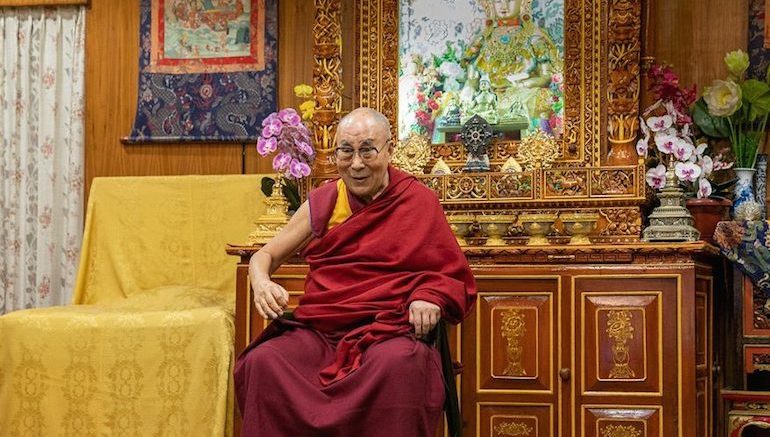DHARAMSHALA: “My physical health, now 83 years and since I am ok, I am looking forward to another 15, 20 years,” His Holiness the Dalai Lama said while playfully showing off his perfect teeth during a live teleconference at his residence on Monday.
His Holiness was speaking on “Happiness & Its Causes” to a group at the International Convention Centre in Sydney, Australia through the live teleconference.
“If you judge from my voice, it’s quite good. I often ask people, including Indian security persons in the morning when I meet them, what they think of my age. They make a guess around 70. Then I tell them that I am in 80s… They say I look very young”.
The teleconference proceeded with a series of questions posed regarding Tibet, conflicts, Donald Trump, the Dalai Lama’s commitments and his ‘valuable mistakes’.
“I think in political matter, I feel there have been no major mistakes. At age 16, I took the responsibility. Then Tibet’s situation was very difficult and delicate so the Regent asked me to take the responsibility. The previous Dalai Lama took the responsibility at the age of 18. I told him that 16 was too early but the circumstances forced me to take the responsibility.
“So I lost my own freedom. At 24, I lost my country, then there were a lot of problems. But I think, now looking back, during those difficult periods, no major mistakes. I think all my major decisions eventually seems very correct”.
His Holiness mentioned an old Tibetan official who remained skeptical of His Holiness’ decision to flee Lhasa in 1959 until the Cultural Revolution unfurled; after which he was convinced that the decision was correct.
“So long run, all my major decisions have become correct,” His Holiness said. “In 2001, I already achieved elected political leadership, next ten years, I remained in semi-retired position. Then in 2011, I totally retired. In anyway I am quite free”.
Responding to a question on how he managed the grief over homeland, His Holiness said Tibetans believed in the law of causality, and the Tibetan problem, he said, was a consequence of “old causes” that had ripened.
“According to Chinese history book, in 7th, 8th and 9th century, there were three major empires: the Chinese, Mongol and the Tibetan empire. In the 9th century, due to some quarrel among the Tibetan emperor, Tibet disintegrated. The problem started during that century. After that I think Tibetans paid attention to their own small circle, including the lamas, locals, and landlords in different parts of Tibet,” His Holiness said, alluding to the disintegration of Tibet.
“History had produced that way. Old causes have already there, so there will be consequences. Nobody can change that.”
He said Tibet remained as one entity because of the Tibetan Buddhist tradition and the Tibetan language. “300 volumes of Buddhist texts translated from India and the language that covered the whole Tibetan area was what kept Tibetans as one entity. Otherwise in the political matter, for several centuries, we really neglected”.
Speaking in light of global conflicts and lack of moral consciousness in societies, the Nobel laureate pressed the need for a more complete education system that caters to the overall wellbeing of a human being.
“Every 7 billion human being have every right to be a happy human being. Now the concern is the existing modern education. It is very much oriented towards material value. Therefore the generation who receive that kind of education eventually goes on to create materialist life and materialistic culture. When they are faced with mental level problems, they are helpless.
He said, “Education should include hygiene of emotion, as a matter of health. the generation who go through such more complete education system, then later part of this century will see leaders with such holistic thoughts. Modern education should be more complete.
“Irrespective of whether you are a believer or not, we cannot escape the necessity of love and compassion.”
He concluded by explaining his principal commitments to the Australian crowd. “My number one commitment is promotion of sense of oneness of 7 billion human beings. Many problems which we are facing are our own creation. The real source of the problem is self-centeredness and divisive attitude on basis of the secondary level of differences. Logically remedy to these problems created on such differences, then we must go to the deeper level to see the oneness of all humanity. I feel this is the key factor.
“Secondly, as a Buddhist monk,” His Holiness said he is committed to encouraging harmony among the world’s religious traditions. “All major religious traditions, including its different ideologies, all carry one message, ie. message of love, forgiveness, tolerance and self-discipline. On that basis, we can develop genuine harmony.
“Number 3, I am a Tibetan and the Tibetan people trust me so therefore politically as I mentioned I have totally retired. Now my commitment is towards preservation of Tibetan environment and ecology. One Chinese ecologist told me that based on many years of observation, he found that Tibetan plateau’s effect on global warming is as much as South and North pole. Therefore, he described the Tibetan plateau as the Third pole. Then, preservation of Tibetan culture of Buddhist knowledge. As far as Buddhist tradition is concerned, the living tradition of Nalanda is available only in the Tibetan Buddhist tradition. With that, Tibetan language is the best language to explain the 1000 years old Indian philosophy and logic. There is no hope in Modern Hindi or English, including the Australian English,” His Holiness concluded.
The session was moderated by Australian journalist, Natasha Mitchell.

